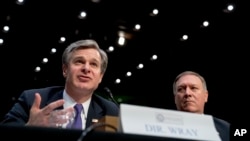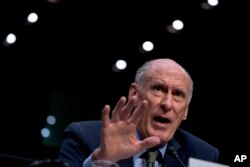Leaders of U.S. national security and law enforcement agencies said Tuesday the U.S. private sector has been helpful in efforts to keep the country safe.
While the leaders did not name companies, industry sectors or what specific help has been provided, they did discuss the challenges of monitoring social media.
The comments may reflect a shift in what law enforcement has seen as the technology industry's adversarial approach when it comes to fighting crimes and addressing national security issues.
The most notable example of this tension was support by tech industry groups for Apple's battle with law enforcement over breaking the encryption of an iPhone used by the man who killed 14 people in the 2015 terrorist attack in San Bernardino, California.
'Forward-leaning engagement'
At a Senate Intelligence Committee hearing Tuesday, Dan Coats, director of National Intelligence, said the U.S. government has received more support from those in the private sector "who are beginning to recognize ever more the issues that are faced with the material that comes through their processes."
Christopher Wray, director of the Federal Bureau of Investigation, referred to the help from the private sector as a "more forward-leaning engagement."
"So, it's teamwork within the intelligence community and then partnership with the private sector, which is, I think, the other big change I've noticed — is a lot more forward-leaning engagement with the private sector in terms of trying to share information and raise awareness on their end," said Wray, also speaking at the hearing.
"Because at the end of the day, we can't fully police social media, so we have to work with them so that they can police themselves a little bit better as well," Wray added.
Gates: Be careful of arrogance
Separately, Bill Gates, the co-founder of Microsoft, said in an interview that tech firms need to be careful of being too arrogant when working in realms outside their businesses or they'll face the kind of government intervention his firm experienced in its antitrust dispute.
"The tech companies have to be careful that they're not trying to think their view is more important than the government's view, or than the government being able to function in some key areas," said Gates in an interview with Axios.
Gates cited Apple's iPhone battle with the government, criticizing "their view that even a clear mass-murdering criminal's communication should never be available to the government."
"There's no question of ability," he said about unlocking the iPhone. "It's the question of willingness."
He also cited companies' "enthusiasm about making financial transactions anonymous and invisible."
Microsoft's consent decree with the U.S. Justice Department came to an end in 2011, a result of the government's settlement with the software giant in its antitrust case.
Remarks on Trump administration
On Tuesday, Gates and his wife, Melinda, issued their foundation's annual letter.
In terms of the Trump administration, Gates wrote that while "we disagree with this administration more than the others we've met with, we believe it's still important to work together whenever possible. We keep talking to them because if the U.S. cuts back on its investments abroad, people in other countries will die, and Americans will be worse off."
Melinda Gates wrote that the president is a role model of "American values in the world." She continued, "I wish our president would treat people, and especially women, with more respect when he speaks and tweets."






